- Home
- Theodore Taylor
Billy the Kid Page 7
Billy the Kid Read online
Page 7
Finally, finishing his plate, he rubbed his belly and raved about the food. He yawned and stretched, smiling at her.
There were two low bunks in the dirt-floored room, and Adriana glanced over at one of them. She asked softly, "¿Siesta, señor?"
Billy frowned at her.
"Siesta, muy bueno," she said.
Shaking his head, Billy laughed. "Wish I had the time."
But the longer Billy looked at the quilt-covered straw mattress, the more tiredness sapped him. Perhaps Art had turned back? With Joe blown up, they couldn't travel fast, anyway. In a moment Billy convinced himself that an hour's sleep would pay off. The mare, too, could use the rest. The fiery sun would lose directness in an hour.
Billy's smile was tired. "You're plumb full o' good ideas, Adriana. Wake me up in an hour, huh? ¿Una hora por favor?"
She nodded.
She watched as he sprawled back, taking a deep breath. He hadn't been in a bed since Wickenburg, fifty hours behind.
He glanced over at her. He'd known other Adrianas in other places, for a few days or a few months. He couldn't understand why he hadn't settled down with one, especially Helga. Always, after a few days, or months, he'd gotten restless again. He yawned and said drowsily, "I do have the luck."
Billy closed his eyes and took another deep breath. He fell asleep almost immediately.
10
JOE HAD BEEN BURIED not long after daybreak.
The Smiths had stopped on the mesa just before midnight because Joe was delirious and screaming with pain. They'd been heading slowly southeast for Colterville to find a doctor but couldn't keep Joe on his horse. Then he'd died, whimpering just before dawn.
Art had sat by his son's grave for a while as the light turned from gray to yellow, thinking about Joe, and then about Billy. His face was void of emotion. He'd watched the sun rise through layers of gilt-edged clouds.
Although Joe had certainly been foolish to throw down on the likes of Billy, Art felt it was his fault Joe was dead. He'd never intended Joe to be killed, especially by a smooth-talking drifter.
For months Art had figured they'd do one more job and then settle down in Arkansas, or someplace like that, well away from warrants and the wanted posters in four states. He felt he was a little old to be gallivanting all over the countryside doing stickups.
They had plenty of money stashed away in El Paso. They'd retire, all three of them, and maybe raise hogs in Arkansas. He'd heard there were good markets for pork in Chicago and New Orleans. Maybe they could still do that, Perry and himself. But without Joe around, it wouldn't be the same.
The yellow light spread over his face. His eyes were set almost hypnotically on the ball of hazy sun that mounted slowly between the broken clouds.
It had been two years since the bank in Austin had foreclosed on his ranch. After a family prayer, Art, Perry, and Joe Williams, which was their real name, revengefully reopened the same bank three days later and relieved it of more cash than the ranch had been worth. Then they took off for Kansas.
Before that the only serious trouble he'd been in was an ax-handle killing—and that man had truly provoked it, pulling a knife like he did. He'd served sue months, all the while keeping Perry and Joe pacified; they'd wanted to come in and blast him out. Oh, how many letters he'd written them, all signed, In the name of our Lord, Your loving Daddy. But none of it would have happened, he thought, if people had just let him alone, hadn't squeezed him. What they got was what was coming, eye for an eye.
Looking back, though, Art thought he probably wouldn't have done it much differently, except for taking on Billy Bonney. Before leaving Texas, just to show their feelings about financial institutions that foreclosed on struggling ranchers, the family had hit the National Bank in Denison.
There'd been two banks in Oklahoma and a train in Kansas. Then a spell hanging around Juárez, hoping the peace officers would lose interest. After that a bank in Silver City, New Mexico, at which time Joe had unfortunately killed a deputy. But that man had asked for it, too—throwing down on poor Joe.
They'd ducked across the Mexican border to spend two fidgety months in Cananea, and then had recrossed near Douglas in early September. After that sorry McLean—and Billy Bonney, unfortunately.
It wasn't the money Billy had taken that galled Art, although that amounted to a considerable sum. It was Joe, dead forever, a few feet away. He'd been fond of that crazy boy. Joe had always been his favorite.
He tossed the dregs of his coffee, then got down on his knees, feeling an abiding need for vengeance. Still without emotion, he said to Perry, "Let's pray a while, then find that kid."
Perry perched Joe's candy paper poke on the ocotillo marker, then knelt down by his father. Soon, they rode off south, picking up Billy's tracks in midmorning.
At a little past two, Perry struggled with his horse in the sheer-walled arroyo. Rearing, shinnying, the animal was bug-eyed with fright at the thick-bodied, strumming sidewinder that was coiling to strike in the dried watercourse.
A few feet back, Art drew, aimed, and fired. The echo was like a howitzer boom, traveling along the arroyo as if it were a speaking tube.
***
WILLIE WAS ON THE APACHE TRAIL, used long before white men crossed the Mississippi or probed tentatively along the California coast. It picked up a half mile south of Marker 416 and snaked down the Verdes, skirting granite, wisely avoiding slickrock patches that would burn pony hooves, staying to tree fallings and soft dirt, taking advantage of natural cuts. It was still a good trail.
Now and then, after midnight, pine-knot torches would flare along it as the trackers paused to check hoof marks at the crossing of another trail.
Whoever was leading the four riders knew where he was going and how to get there. He knew the Verdes and the trail. Willie remembered that he and Billy had ridden the narrow 'Pache path several times. Billy was the leader, Willie guessed.
By daybreak, which came on pink and gray with a fold of gold-tinted clouds where the sun would soon jut up, they were out of the Verdes and into the scrubby Ben Moores.
They stopped to rest, eat, and water the mounts. Low fog drifted aimlessly off a crystal brook. By the side of the trail, as the day began to warm, Willie and Big Eye squatted on the bank, supping coffee.
Big Eye was curious about the man named Billy Bonney. He'd heard the argument in front of the hogans with the other white men, the hint that one of the robbers was a friend of the sheriff, that the sheriff might let him get away. He'd seen the short explosive fight and was impressed with Willie.
On the trail down from the SF, P & P tracks, the sheriff had barely spoken. Then, only to comment on the sure pace the outlaws had set, or to ask a sharp question when Big Eye had knelt down to sniff horse droppings and estimate how much time had passed since the robbers' horses stiff-legged by.
The other Yavapais, tending the five horses and pack mule, spoke softly to one another. Big Eye asked the sheriff, "You know one of these men we track?"
The brook babbled for a long time before Willie answered. "Yeh, I know one."
It was another full minute before Willie continued. "They only made one of that man. I take that back. They made more, but they're all dead, Big Eye." Willie looked over at the Yavapai and laughed without humor. "Most of the time, from what I've heard, they died in saloons over a poker argument or over a petticoat, or they were lynched. That's Billy Bonney, my cousin."
The Indian nodded.
"At the same time, he's a fine boy and a great friend," Willie added.
Big Eye's dark eyes posed a question. "If he were my friend, I'd let him get away"
Kate had said that.
Willie stared back, but he thought it better not to answer.
He got up and stretched, working the muscles in his neck and shoulders. He took a look at the rapidly rising sun and said, "We can't stay here all day."
The Indian nodded and scooped a handful of water from the brook.
In twenty minut
es they were off again and soon followed the prints to Dunbar's Rocks.
They searched the area, finding cigarette butts and hoofprints of four horses. Then it appeared to Willie that the riders had split up, one man going off alone, three following. Big Eye agreed. There was dried blood on the harsh ground.
***
MIDMORNING, WILLIE STARED down at the mounded dirt. It looked fresh and hurried. Red ants were beginning to burrow into it. Remains of a small fire were nearby and somebody had made coffee. At dawn, likely, Willie thought. They were south of Dunbar's.
Big Eye murmured, "Wasn't much of a funeral."
The grave was marked with some rocks at the head, and a dried ocotillo branch. A brown paper-poke was stuck on the branch.
Still staring down, afraid that it might be Billy, the sheriff ordered, "Someone scrape the dirt away." He looked over at the Yavapais.
Big Eye said, "He's a white man. He might resent an Indian touching his face."
Willie asked sourly, "Where'd you learn that?"
It brought a smile to the Indian's face. "Not in any school."
Willie glanced at the other Yavapais. They were determinedly gazing off, away from the grave.
Willie dismounted from Almanac with weariness and began pushing dirt back from the spot where he thought the head might be. He worked for a few minutes, then stopped, wiping sweat from his brow and tilting his hat back.
Big Eye reined to a position directly over the mound. "You think it might be your friend?"
Willie responded with a cold look, then bent to the task again, brushing the fierce red ants off his hands.
The sun was already savage in the badlands sky, cutting down on the small mesa, which was almost white on top, sloped up in sandrock from deeps of orange. The heat bounced off it in glassy waves.
Big Eye lifted the paper poke from the ocotillo. He found a large red gumdrop still stuck to the bottom. He pulled it loose and popped it into his mouth, chewing thoughtfully. Then he looked up into the milky sky. Buzzards were already beginning to patrol.
Willie finally uncovered the face. Red ants crawled across the cheeks, into the mouth, and up into the nostrils. He'd never seen this man before. He studied the smudged, death-paled face. He was young but ugly.
He sighed relief, muttering, "He's a stranger to me." Rising, he marked the spot in his mind so that Sam Pine could type up a report. Perhaps someone would want to come and dig him out.
As he began kicking dirt back over the face, he became aware of the buzzards aloft. It never took them long. They were circling in great, actually beautiful, glides.
He heard Big Eye say philosophically, "What the coyotes don't get tonight, the buzzards will tomorrow. They'll feast."
Willie nodded, almost certain now that the lone rider ahead was Billy, separating from the stickup riders, one of them dead.
Head tipping toward the grave, Big Eye asked, "You think your good friend shot him? He seems to be getting deeper into trouble."
Willie snapped, "I don't know," beginning to feel annoyance at the aloof Indian's comments.
He looked around. "Let's find some shade and rest."
They'd pushed the horses since leaving Dunbar's.
A brave buzzard landed near the new grave and Big Eye shot it.
11
BILLY RODE AWAY from the adobe, keeping south, where the land was a basin. Low, barren sun-roasted mountains, anchoring dried brush, reached up on either side. He'd spent too long with Adriana.
Two miles on, he spotted a small herd of mustangs grazing on skimpy brown grass that had been watered by the winter rains sluicing down the arroyo into the basin. He slowed as they spotted him.
Billy rode into them as they broke and ran, galloping south. Yelling, urging them on, he mixed his tracks with theirs for almost a mile. When he felt his bell mare gasping, he veered away, climbing one of the low mountains.
The herd slowed but still pounded south in a cloud of dust.
Reaching a shoulder about eight hundred feet up, Billy led the horse into shade beneath it. He sat down, breathing hard.
After a while he made up a smoke and lit it.
Billy relaxed on the hillside, thinking of Art and Perry.
Rabbits hopped from brush tangles. Little gray birds darted by. He flipped pebbles at a rock lizard.
About an hour later he tensed up, watching Art and Perry trot across the basin, stopping and circling with frustration where the mustang hooves had ripped earth loose.
Then they kept going south, and Billy breathed relief.
Watching them he began thinking about the high country north. There was no reason not to double back. No reason not to stop by Willie's place and say hello. See Willie and Kate, maybe spend the night. Then he could dawdle across to California. Maybe go to Monterey, to see the ocean.
Billy grinned at the diminishing forms. "You jus' keep goin' that way. I suddenly got an urge for high pines."
He waited another twenty minutes, then topped the low mountain, angled down its east slope, and turned north, going at a leisurely trot.
***
ADRIANA CAME OUT into the yard, frowning and puzzled. Now there were five strangers. A gringo and four in-dios. There had been more men down the arroyo this day than any she could ever remember. It was seldom used as a trail.
Willie addressed her in English. "I'm lookin' for a fellow..."
Adriana stared at him.
"Hombre americano," he said, switching to Spanish. "Mi amigo."
Willie glanced at Big Eye.
"Uno americano," Willie began again. "On primero caballo. Man about this high." Willie placed an arm in the air.
Adriana did not respond. She was confused.
Willie reached into his saddlebag, withdrawing the framed photo of Billy that he'd taken off the bedroom bureau the previous night.
Adriana examined it, then said, "Sí."
The sheriff saw a diamond stickpin laced into her blouse. Billy had been to the adobe hut, all right.
PART II
Shoot the Boy Down
1
THE HOUNDS BARKED at Billy as he rode through the open gateway of the Double W, and then they sniffed, remembering him. Tails began to wag as he called their names. They ran beside him.
Near the front porch, he dismounted and went down on one knee to rub them affectionately. "Hey, Duke, ol' boy! How you, Cotton?" he said, happy to see them again. Then he sensed someone standing a few feet away and looked up.
Kate was on the porch, framed on the steps in the oblong of lantern light from inside. Though wide-eyed and incredulous, she looked lovely. He rose up. After all the knocking about, he hadn't remembered that she was so pretty and wholesome. He stared at her.
Kate was shaking her head, reaching for words. Then they rushed out, and weren't quite a greeting. "Of all the crazy ... What are you doing here, Billy?" A horde of headless ghosts wouldn't have floored her more.
Billy grinned at Kate as if two years hadn't passed. "Jus' ridin' by. 'Lo Kate."
He felt a warm excitement, waiting for Willie to hear the chatter out front and come rolling through the door, big as a bull moose.
Partially recovering from the shock of seeing him, Kate said angrily, "Get back up on that horse and get out of here. You held up a train!" She sounded as if she were berating a child.
Billy was startled. Not at the fact she knew a train had been stopped, but that he'd already been connected with it. Trying desperately to figure it out, he said slowly, "Word didn't used to travel that fast."
Kate frowned. "Look at you in those fancy clothes."
There was little use in denying it now, Billy decided. He knew she was wondering what to do. A hand came up to her lips. Finally she said with anguish, "Billy, you can't..." Completely unstrung, she didn't finish.
Billy chose to take advantage of her confusion. Still inspecting her, he mounted the steps. "You're gettin' prettier every year. This moonlight, you're plain beautiful."
He
noticed a look of different alarm in her eyes.
"Do I kiss you, or do we jus' shake hands, Mrs. Monroe?" He grinned. "I'd like a lil' kiss."
"You haven't changed." There was a shake of head.
Billy shrugged and pecked her cheek, then stood back, beaming at her out of four days' growth of stubble.
"You can't stay here," Kate said weakly.
"Well now, why can't I?" he answered, feigning hurt. "Willie around? Where is that ol' moose? Gone to town?" He looked past her into the living room.
"He's out trying to find you."
That is odd, Billy thought. He sensed something was wrong. "Oh? How did he know I, was back in these parts?" His eyes narrowed. "Don't tell me they rung him in on a posse?"
Feeling positive satisfaction, Kate answered crisply, "He's the sheriff now, Billy." She let the sentence hang in the air, then added, "Jack Lapham identified you."
Billy knew his mouth was unhinged. His face matched Kate's of a moment ago. Then he groped for words and found his tongue. "What ... what happened to old man Metcalf? I think you're kiddin' me."
"Metcalf was ambushed. A year ago."
"Willie's the sheriff?" Billy couldn't control his wild laughter. It came out in peals and bursts as his face turned scarlet. Willie Monroe the sheriff? He was too young to be a sheriff. Even funnier, the place he'd picked to stop a train was right under that big Monroe nose. He laughed until he had to lean against a porch post.
He squeezed out, "The sheriff here couldn't catch a cold ... or somethin' like that."
Kate remained an observant statue. "You're an outlaw. You posed as a deputy."
He took a long breath. "Just this once. Well, I mighta known. The Bonney luck. You say he's trackin' me?"
Kate nodded.
Billy laughed again at the irony of it, and then proceeded with another appraisal of Willie's wife, head to toe. She hardly looked a day older. Still a teenager, like he was.

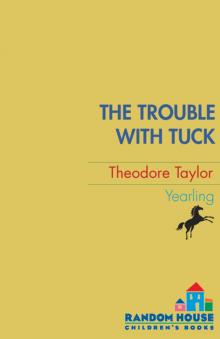 The Trouble With Tuck the Trouble With Tuck
The Trouble With Tuck the Trouble With Tuck The Bomb
The Bomb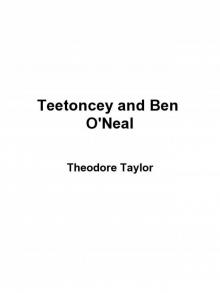 Teetoncey and Ben O'Neal
Teetoncey and Ben O'Neal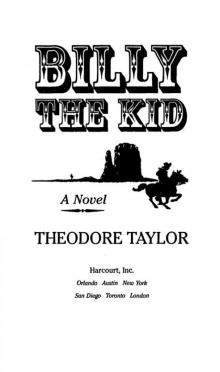 Billy the Kid
Billy the Kid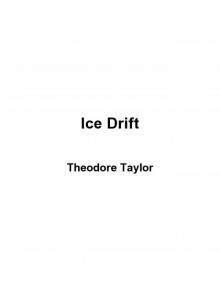 Ice Drift
Ice Drift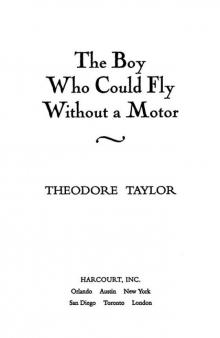 The Boy Who Could Fly Without a Motor
The Boy Who Could Fly Without a Motor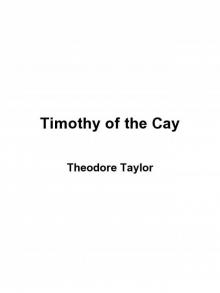 Timothy of the Cay
Timothy of the Cay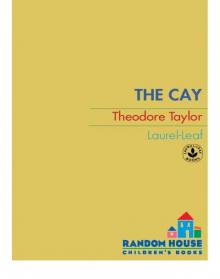 The Cay
The Cay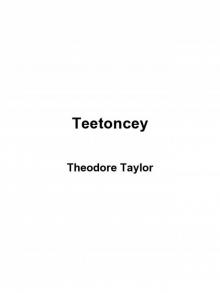 Teetoncey
Teetoncey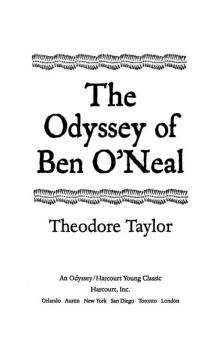 Into the Wind: The Odyssey of Ben O'Neal
Into the Wind: The Odyssey of Ben O'Neal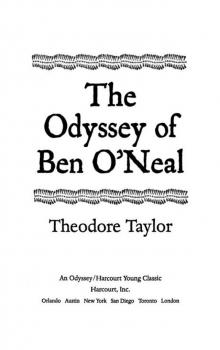 The Odyssey of Ben O'Neal
The Odyssey of Ben O'Neal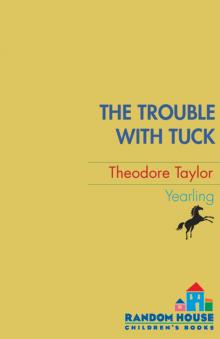 The Trouble with Tuck
The Trouble with Tuck